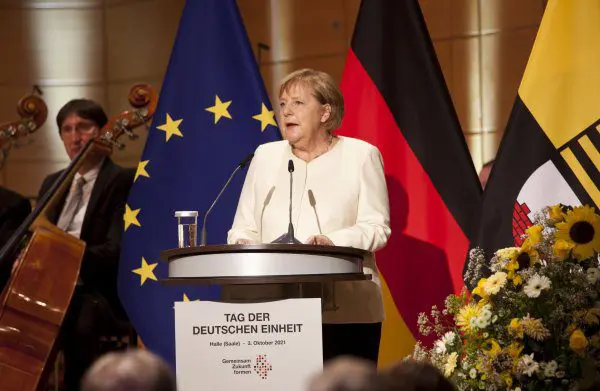Political leaders in Germany must overcome their differences, but also be open to differences in society. Such a message was given by Chancellor Angela Merkel in perhaps her last solemn speech at the head of the Federal Republic.
Merkel, who is leaving the post after 16 years in power, spoke in Halle on the occasion of the 31st anniversary of the unification of Germany and the GDR on October 3, 1990. Also today, official talks began on choosing her successor after last week’s vote.
“We may argue in the future how exactly, but we know that the answer is in our hands. That we need to listen to each other and talk to each other. That we have differences, but above all common things. Be ready for new meetings, be curious about “Tell your own stories and tolerate differences. This is the lesson of 31 years of German unity,” Merkel said.
The message was addressed to politicians who have begun negotiations to form the next government. Merkel’s coalition partners, the Social Democrats (SPD), won last Sunday’s election. Candidate Olaf Scholz’s party garnered 25.7 per cent support, and Merkel’s HDZ / HSS alliance collapsed to its all-time low of 24.1 per cent, led by the much-criticized Armin Lasche.
The two parties begin talks with the Greens and the Liberal FDP on Sunday, with which they must reach an agreement for either of them to take over as chancellor.
“Sometimes we take our democratic achievements too lightly,” Merkel said in a speech in Halle, urging the public to “reject radicalization,” referring to the neo-Nazi attack on a synagogue in the city two years ago. “Diversity is not a threat to society.”
What has Merkelism left us?
Many in Europe regret that Angela Merkel is leaving, but they are relieved by the end of Merkelism. The neologism that arose from her name has a rather negative sound. She confirmed the proverb that only bushes grew around tall trees, and her heirs, raised by her, turned out to be political dwarves as soon as they crawled out of her shadow. Merkelism, which was supposed to serve as a political springboard, throws them out of the forefront.
At least that is the picture in Germany after the general election, in which Merkel’s conservative right and her Bavarian allies suffered a historic defeat. It is interesting to see how 6.5 million voters fled in order not to legitimize Armin Laschet as the legal successor of Merkel at the helm of Germany. Two million of them went to the Social Democrats, 1.3 million to the Free Democrats, and 1 million to the Greens. The three parties are now considering forming a coalition to end Merkel’s 16-year era. Her successor, Lachet, who boasts of being a direct descendant of Charlemagne (the father of the first united Europe in the ninth century), proved so petty for his megalomania that he was too late to congratulate the election winner, Olaf Scholz. It was difficult for him to realize that he had lost the election because Merkelism was deceiving him that he had subscribed to power.







